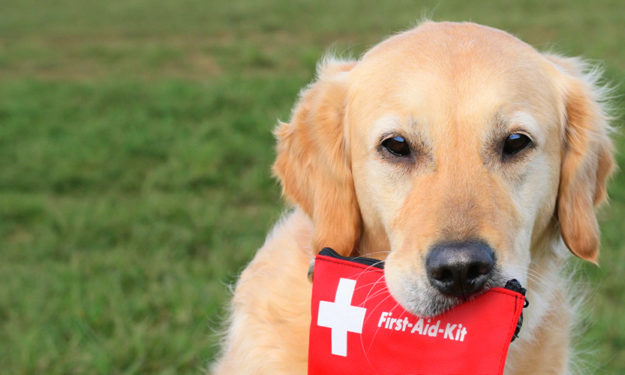Pet First Aid Kit: Printable Checklist

Every pet parent’s worst fear is having something bad happen to their beloved friend. No matter how calm, cool, and collected I think I am, if my dog gets injured, I am a blubbering lunatic. It can be a cut on his paw pad from hiking or a broken toe nail. I know these are not life threatening injuries, but we naturally want to take the pain away and fix them.
One very helpful tool in case of emergency is having your own first aid kit designed for your cat or dog. Now, this doesn’t replace a trip to the ER or an urgent care necessarily, but it can prevent the injury from getting worse, until you get there. It is also important to mention that unless instructed by a doctor, you should never keep a wrap or bandage on your pet for very long. Swelling, infection, or serious damage could happen if it is not wrapped appropriately. You never know what could happen on hikes in the woods, swimming in the lake, or even in your own home. So let’s get our kit prepared. Printable First Aid Kit Checklist
What You’ll Need for a Pet First Aid Kit:
| Phone numbers: Your regular veterinarian, the closest emergency room and veterinary urgent care, poison control (888) 426-4435 |
| A spare leash |
| Self-cling bandage (or vetwrap): Bandage that stretches and sticks to itself |
| Muzzle or long piece of cloth to prevent biting When pets are badly injured it won’t matter that you are their best friend. If they are in enough pain, they will want to protect their injury. |
| Gauze pads |
| Bandage tape |
| Ice pack |
| Cotton balls |
| Scissors |
| Saline solution |
| Tweezers |
| Rectal thermometer Temperatures should not rise above 103˚F or below 99˚F |
| Disposable gloves |
| Blanket |
| Diphenhydramine (Benadryl) if approved by a veterinarian You can ask your veterinarian for your pet’s dosage and write it on the notecard with your phone numbers |
| Styptic powder (Kwik stop) |
| Nail clippers |
| Flashlight |
| Rubbing alcohol (to clean the thermometer) |
| Your pet’s paperwork Rabies certificate, important medical records |
Another reason to keep a first aid kit in your car is to help someone else who is need. Not everyone is as prepared as you are (or soon will be), but their pets shouldn’t suffer! Good luck, and like all emergency or urgent care services and first aid kits, we hope you’ll never need it.
Written by LAUREN PARECE, BS, DMCA, OMCP